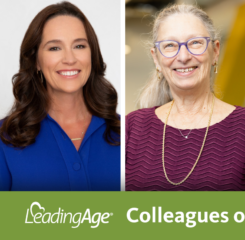“A very lonely journey” was how Deke Cateau, LeadingAge National board member, described his first year as chief executive officer at A.G. Rhodes in Atlanta.
“Very few people looked like me,” said Cateau, a native of Trinidad. “Very few people spoke like me.”
Cateau used his personal story to begin an April 8 virtual event hosted by LeadingAge’s new Leaders of Color (LoC) Network. But his was not the only personal story to emerge when a panel of four leaders of color at LeadingAge member organizations shared their career journeys with the event’s 200 registered participants.
The LoC Network provides a forum where senior, mid-level, and emerging leaders of color employed by LeadingAge member organizations can find support for career advancement, share work-related challenges and success stories related to race and racism, and hear experts discuss topics reflecting the expressed needs and interests of people of color within the field of aging services.
The 90-minute network event was facilitated by Cateau and Erica Thrash-Sall, executive director of McFarlan Charitable Corporation in Flint, MI. According to Thrash-Sall, the LoC Network is designed to relieve the isolation that many people of color experience while working in organizations that are predominately white.
“It’s important for us, as we’re introducing people to our sector, to have a network like this to support them,” Thrash-Sall told the gathering. “This is a safe space to be able to share what people might face and might not share within their organizations.”
A Variety of Discussion Topics
Panelists at the LoC Network event talked honestly about their own career journeys, sharing the factors that helped them advance to senior positions in their organizations and the barriers they encountered along the way. A video of the event is available for viewing; here are a few highlights:
Learning Through Hard Work
Janet Stringfellow, president & CEO at Volunteers of American of Florida, attributed her career success to her willingness to make lateral moves within her organization, rather than focusing all her energy on upward mobility.
“I was always willing to try new things,” said Stringfellow, a native of Puerto Rico. “And if someone saw potential in me and asked me to (take on something new), I would just give it a try. And that helped me to grow and learn a lot in the process.”
Similarly, Thrash-Sall reported being so committed to making a difference in her early career that she often volunteered for work assignments that no one else wanted. In the process, she was able to influence others.
“Even when I wasn’t a formal leader, I got a lot of people to help me, to buy into the work that we needed to do,” she said. “It was through that informal leadership that I really grew.”
Influenced by Family Ties
Family ties were extremely important to the panelists because they provided solid values on which to base their work and invaluable guidance in making personal and career decisions.
Thrash-Sall cared for both her grandfather and her grandmother before they died at 88 and 99, respectively.
“I learned a lot about what (services) did exist, what didn’t exist, and especially what didn’t exist unless you had a whole lot of money,” she recalled, adding that this lesson spurred her to devote her career to serving vulnerable populations.
Similarly, Darrick Lam, president & CEO at ACC Senior Services in Sacramento, CA, said his late mother’s guidance and advice helped shape his career journey.
“My mother … would say, ‘Son, your mom is only 4’6”, but I’ll always stand very tall,’” recalled Lam, who is Asian American. “So, I just basically follow her teaching and that works.”
Finally, Karyne Jones, president & CEO at the National Caucus and Center on Black Aging, credited her parents with giving her the confidence she needed to make an impression, even when she was the only person of color in a room or at a table.
“My parents instilled in me … that nobody in the room is smarter than me,” she said. “They may know more than me, but they’re not smarter. When you are the only (person of color in the room), that’s your opportunity to share, to teach, to feel your own confidence because you’re … at the table for a reason. Take advantage of that. Don’t be intimidated.”
Importance of Mentors
Every panelist encouraged leaders of color to turn to mentors and role models to guide their careers and offer emotional support.
“It’s very lonely if you’re the only one facing the atrocities, facing being gaslighted, facing the microaggression,” said Lam. “So, turn to someone whom you can relate to and ask for help. Share your ideas and frustrations and see (how) other people can help you.”
In addition, don’t wait for mentors to come to you, advised Thrash-Sall.
“Mentorship … is something you do have to seek out,” she said. “People don’t always know that you need help. You have to really be vocal, saying ‘I’m looking for this type of support.’ Tell other people because if they can’t mentor you, they may be able to help you find someone who can.”
Take Control of Your Career
Finally, panelists encouraged listeners to direct their own careers and create their own opportunities.
“I really own my career,” said Thrash-Sall. “It’s my responsibility to grow, (and) to get the skills I need to learn.”
In addition, she advised event participants to build an “outside network” by volunteering, serving on boards, and getting involved in the Leaders of Color Network “so people outside your organization will see your gifts and your skills.”
For More Information
To learn more about the panel discussion, watch a video of the LoC Network Spring Event. For information about how to join the Leaders of Color Network, contact Amma Addo.

 Shutdown Week Three: Impact of Ongoing Closure on Affordable Housing
Shutdown Week Three: Impact of Ongoing Closure on Affordable Housing Colleagues on the Move, February 4, 2026
Colleagues on the Move, February 4, 2026


